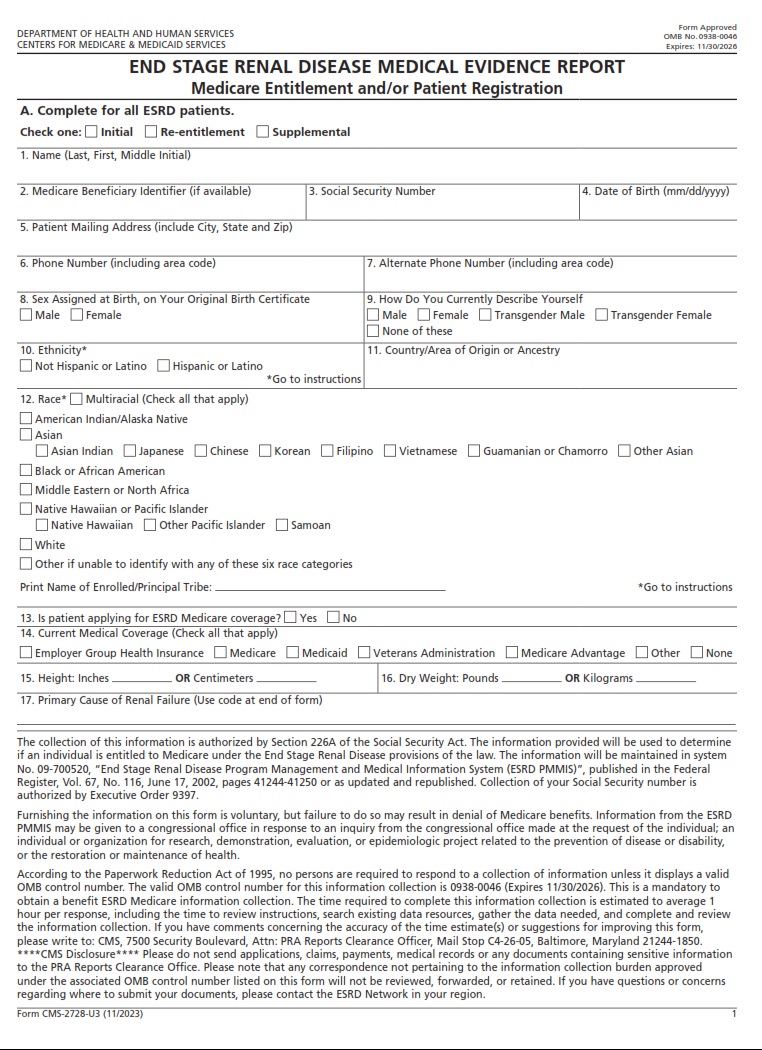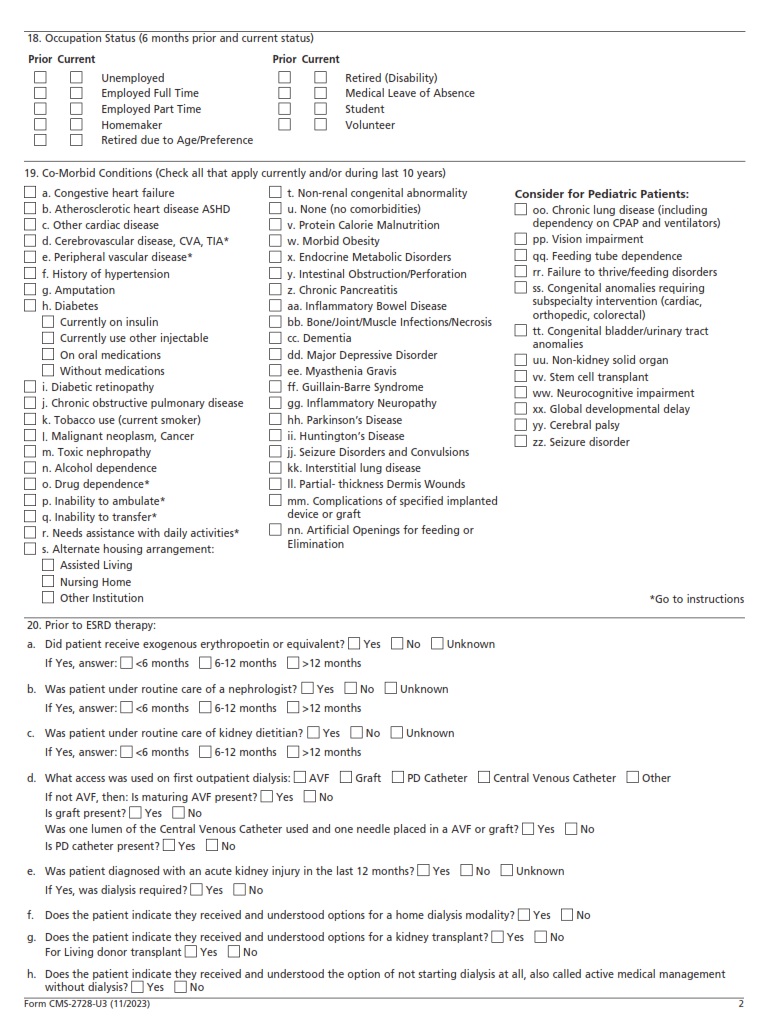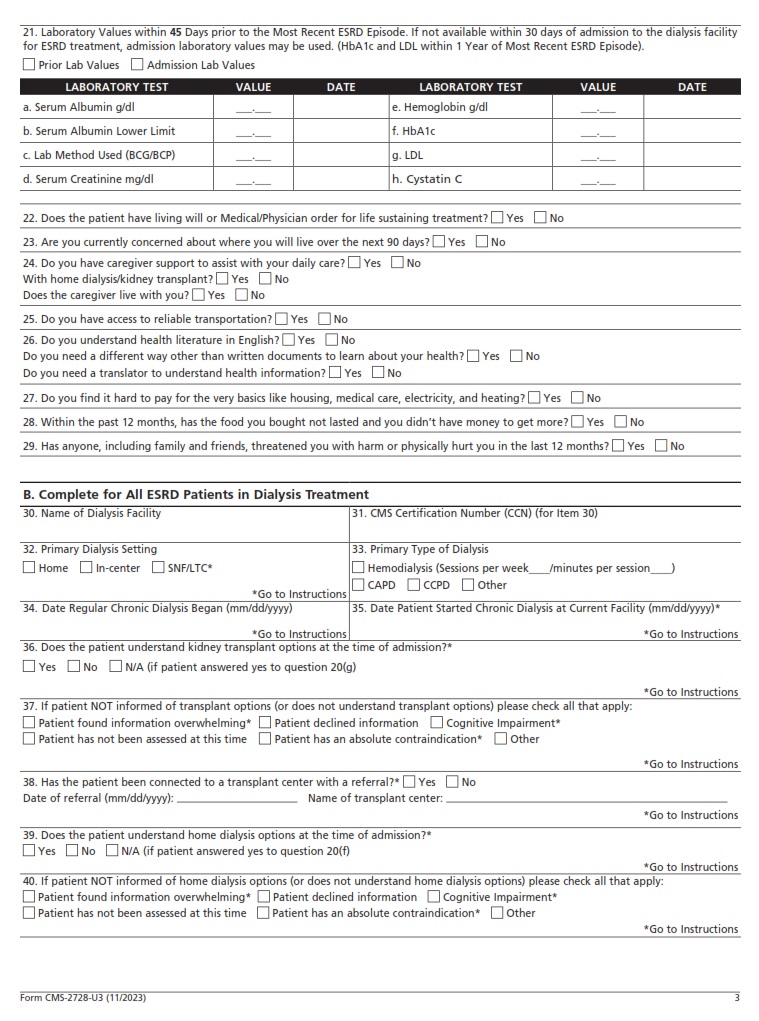CMSFORM.ORG – CMS 2728 – ESRD Medical Evidence Report Medicare Entitlement and/or Patient Registration – As the healthcare landscape continues to evolve, the importance of accurate and thorough documentation in managing patients with End-Stage Renal Disease (ESRD) cannot be overstated. Enter CMS 2728 – a crucial form that serves as the ESRD Medical Evidence Report for Medicare Entitlement and Patient Registration. This seemingly routine paperwork holds immense significance in determining a patient’s access to essential healthcare services, making it a cornerstone in the realm of ESRD care.
In this article, we delve into the intricacies of CMS 2728, exploring its role in establishing Medicare entitlement for those battling ESRD while shedding light on the impact it has on patient registration. From deciphering its key components to understanding how it influences treatment options and reimbursement processes, we uncover why this form is more than just another bureaucratic requirement—it’s a lifeline for individuals navigating the complex terrain of renal healthcare.
Download CMS 2728 – ESRD Medical Evidence Report Medicare Entitlement and/or Patient Registration
| Form Number | CMS 2728 |
| Form Title | ESRD Medical Evidence Report Medicare Entitlement and/or Patient Registration |
| Published | 2023-11-01 |
| O.M.B. | 0938-0046 |
| File Size | 123 KB |
What is a CMS 2728?
A CMS 2728 form, also known as the ESRD Medical Evidence Report, plays a crucial role in Medicare entitlement and patient registration for individuals with End-Stage Renal Disease (ESRD). This comprehensive document is utilized to collect vital information about the patient’s medical history, treatment plans, laboratory results, and other pertinent details essential for determining eligibility for Medicare benefits related to ESRD. Furthermore, the CMS 2728 form serves as a tool for healthcare providers to accurately assess and monitor the patient’s condition, ensuring proper coordination of care and adherence to regulatory guidelines.
Completing the CMS 2728 form requires meticulous attention to detail and accuracy due to its significance in establishing Medicare coverage for ESRD patients. Healthcare professionals must diligently record all relevant information regarding the patient’s diagnosis, treatment modalities, dialysis frequency, laboratory values, comorbid conditions, and other critical data points. By diligently documenting this information on the CMS 2728 form, clinicians can facilitate efficient communication among healthcare teams while enabling seamless access to essential resources and services necessary for managing ESRD effectively.
Where Can I Find a CMS 2728?
If you’re in search of a CMS 2728 form for ESRD (End-Stage Renal Disease) patients, you can easily access it through various channels. One convenient option is to visit the official website of the Centers for Medicare & Medicaid Services (CMS). Here, you can navigate to the forms section and find the CMS 2728 readily available for download. Additionally, healthcare providers and facilities that administer care to ESRD patients are equipped with these forms and can provide them upon request.
Another avenue to acquire a CMS 2728 is through your healthcare team or dialysis center. These professionals are well-versed in the documentation required for Medicare entitlement in cases of ESRD and should be able to furnish you with the necessary form promptly. It’s essential to ensure that all sections of the CMS 2728 are accurately filled out to facilitate a smooth process for Medicare enrollment for ESRD patients. By being proactive in seeking out this form, individuals can streamline their access to vital medical services and support related to End-Stage Renal Disease while navigating Medicare regulations effectively.
CMS 2728 – ESRD Medical Evidence Report Medicare Entitlement and/or Patient Registration
CMS 2728 – ESRD Medical Evidence Report is a critical form in the realm of Medicare entitlement and patient registration for individuals with End-Stage Renal Disease (ESRD). This document plays a pivotal role in determining eligibility for Medicare benefits and ensuring proper care provision to those suffering from this chronic condition. Through the completion of CMS 2728, healthcare providers gather essential medical information about the patient’s ESRD diagnosis, treatment plan, and overall health status to facilitate appropriate coverage and support services.
The intricacies of filling out CMS 2728 highlight the complex nature of managing ESRD cases within the framework of Medicare regulations. From detailing onset dates to documenting dialysis treatments or kidney transplants, each section of this report serves as a vital piece in understanding the patient’s journey with ESRD. Moreover, accurate completion of CMS 2728 ensures that patients receive timely access to necessary healthcare resources, underscoring the importance of thorough medical evidence reporting in promoting better outcomes for individuals dealing with ESRD.
CMS 2728 Example


